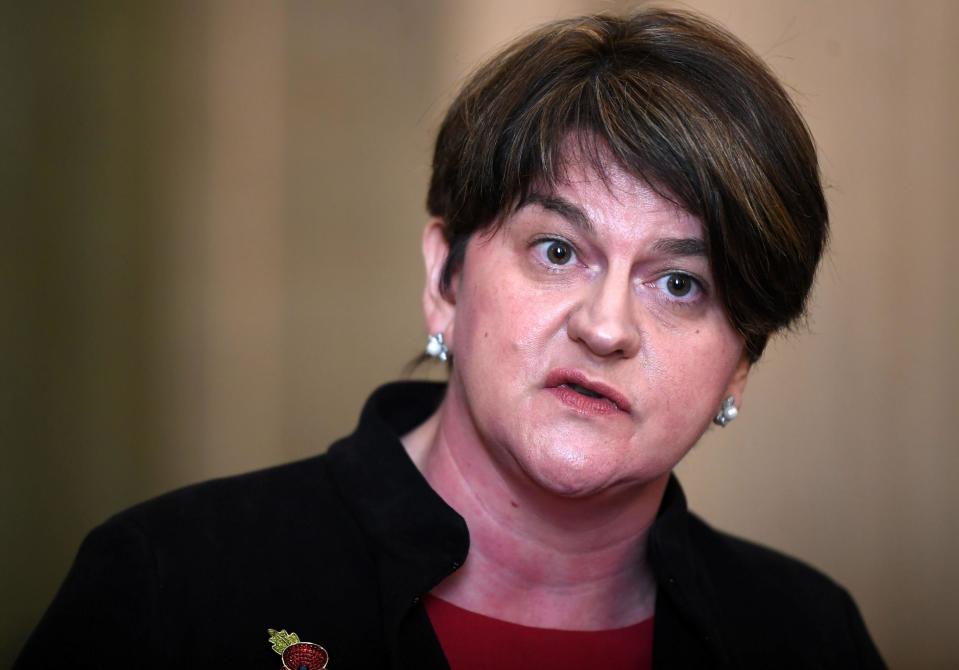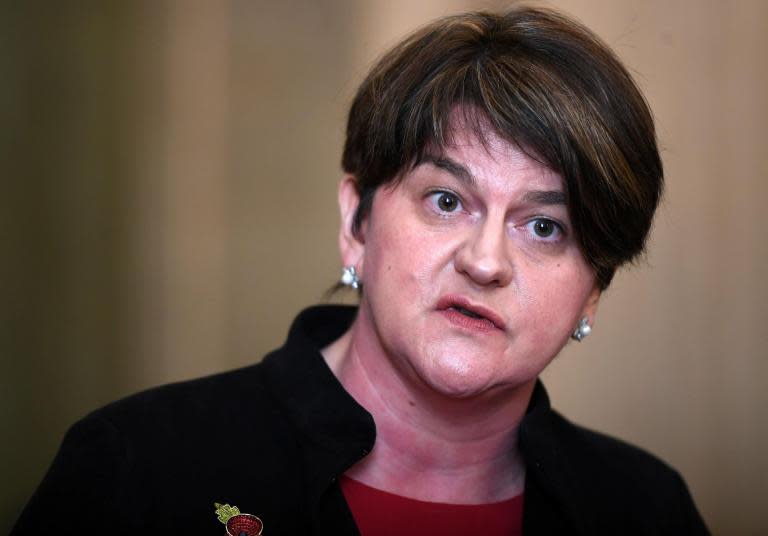Brexit: DUP leader Arlene Foster hopes border deal is close
The leader of the DUP has said that she hopes a solution to the Brexit Irish border problem is “close”, as she doubled down on her red lines in a meeting with the UK's Brexit Secretary on Friday.
Arlene Foster met with Dominic Raab on Friday in Northern Ireland to discuss her party’s concerns with the proposals so far.
“Goodness, we have been here on a number of occasions and I hope we are close a deal that will work for Northern Ireland, that is what we want,” Ms Foster told reporters following the meeting.
The DUP, on whom Theresa May relies for a majority in the House of Commons, have said they will not accept Northern Ireland being treated any differently from the rest of the UK, as it would under the EU’s plans so far.
The minor party’s red lines mean the British government has been effectively left negotiating with both the EU on one side and its allies in parliament on the other.
A delegation which included Ms Foster, North Belfast MP Nigel Dodds, MEP Diane Dodds and South Belfast MLA Christopher Stalford met Mr Raab at Stormont House in Belfast on Friday afternoon.
“This is part of an ongoing range of meetings we have with Dominic. Delighted that he has come over to Northern Ireland and made a visit to the various ports, we look forward to continuing our engagement with him,” she told reporters.
She said her party has made it clear to the UK cabinet minister that “from the constitutional point of view but also from an economic point of view that it is very important that as well as not having any customs barriers, we cannot have any regulatory barriers”.
Though the party leader struck an optimistic tone, her account of the meeting would suggest she doubled down on her red lines on checks on the Irish sea.
The British government says it agrees with the DUP and will not accept a customs border on the Irish sea, viewing it as a breach of sovereignty. But senior UK government officials have indicated that they would be willing to accept a regulatory barrier – a concession that would make finding common ground with the EU a lot easier.
Michel Barnier, the EU’s chief Brexit negotiator has said that there would have to be regulatory checks, however, and that they might increase ten-fold. There has been no outward sign that the EU is shifting its position in that regard.
Ms Foster welcomed Mr Raab’s Friday visit to Northern Ireland, adding: “I am glad that he took the chance to visit the ports today because he would have been able to see what happens at the ports.
“We are engaged in an ongoing process, we want to be as helpful as we can in these negotiations, we want to get a deal on exiting the European Union that is good for Northern Ireland and it can only be good for Northern Ireland if we remain a full part of the United Kingdom.”
The dispute around the Northern Ireland border stems from a commitment by both the UK and EU to avoid a hard border between the Republic and the North, but disagreement on how this should be achieved once the UK leaves the EU and trade barriers are re-erected.
Theresa May's decision to leave the single market and customs union means that there would ordinarily have to be checks on goods between the UK and EU, but both sides want to mitigate this for the special circumstances on the island of Ireland. The Good Friday Agreement stipulates that there can be no hard border.
The EU has suggested that Northern Ireland effectively remain in the single market and customs union, but this plan would mean checks at ports between Northern Ireland and Great Britain – which Theresa May has said "no UK prime minister" could accept as an alleged breach of sovereignty.
Both sides are currently casting around for solutions as the clock ticks down on negotiations, with some suggesting that the entire UK could temporarily remain in a customs union with the EU to eliminate most checks unless and until another solution is found.
Some Tory eurosceptics however worry that such a plan could tie the UK to a customs union with the EU indefinitely, which they do not want, while the DUP is concerned about the remaining checks that would not be eliminated by a customs union – regulatory checks.

 Yahoo News
Yahoo News 

